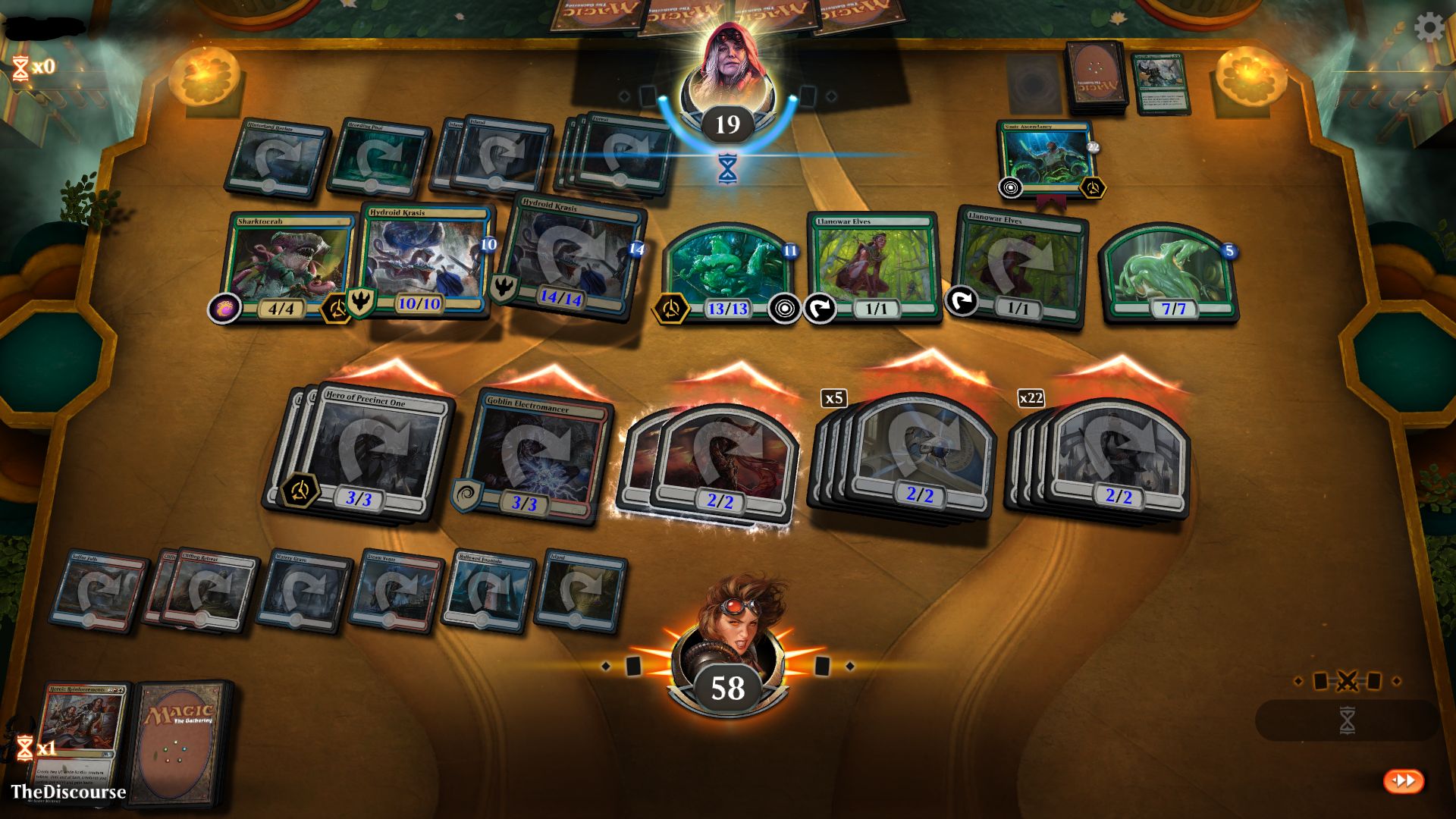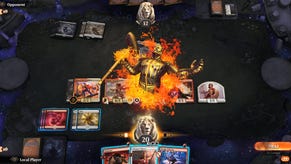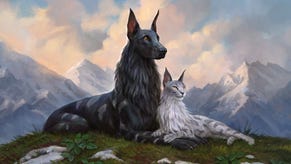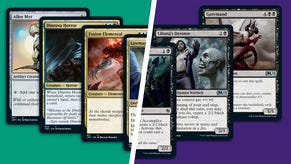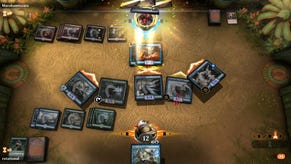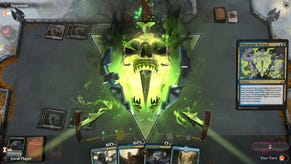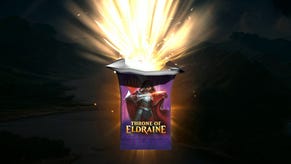Wot I Think - Magic: The Gathering Arena
Played their cards right
Even though there’s been a digital version of Magic: The Gathering in some form for more than seventeen years, it’s not the game that I, a casual but long-term devotee of the physical game, am recommended on a near-monthly basis. By now, I’ve lost count of the number of friends who have approached me with wide-eyed enthusiasm and told me ‘mate, you need to play Hearthstone!’
Any digital card game exists by default in the shadow of the Blizzard behemoth, and most newcomers have failed so much as to nip at its ankles, many of them withering in the darkness despite being quite good. But now, after a year in open beta, Magic: The Gathering Arena is out. If it can wrest away Hearthstone’s status as the game that’s actually recommended to tabletop MtG players, it will be quite something.
I have to stress, it’s because of my love for the paper version of MtG, rather than a deep commitment to digital CCGs, that I’m writing this review. Because people like me, presumably, are a good slice of Wizards of the Coast’s target demographic. If they hope to succeed with MtG Arena, they don’t just need to convert people who might be wavering on Hearthstone - they also have to tempt those, like me, with physical decks lying around but no time to organise a real-world game.
So: can they do it? Does MtG Arena manage to capture the excitement of hurling goblins at your friends in a pub? Can card-sorting ever be as fun when you don’t get to hold the precious shiny ones in your sticky little hands? And for newcomers to CCGs altogether, is it accessible enough to combat the bafflement that descends when you begin to talk about untapping and cycling? Frankly, yes - and here’s why.
Wizards know how to suck people in. They already do sterling work encouraging newbies to try out tabletop Magic: offering basic two-deck packs you can pick up and play for less than a tenner, and even ‘game night’ packs of five ready-built decks with which you can hook in all your friends.

It’s clear when you first log in to MtG: Arena that they’ve been equally savvy here. The tutorial might be tedious for seasoned players, but it’s so clear and simple that I’ve already told friends to use that to learn the physical version, rather than rely on me waffling in person. Once you’ve walked through the tutorial you’re given five basic decks, one of each colour, which you can add to by completing quests, playing matches and generally living your best life as a powerful, magical wizard.
Matching my basic decks against real-world opponents mere seconds after I’d graduated from the tutorial feels a bit frightening, so I begin at the very shallow end, battling a chirpily naïve bot who repeatedly expresses a desire that both of us win every game. Its relentless encouragement echoes the friendly welcome you get in Hearthstone, though it feels incongruous next to the serious, dark beauty of Magic artwork.
Play itself is supremely satisfying: creatures take a run-up before doing damage, and the resulting battle sound effects give me a proper kick of power-lust when I smash pain into my opponents, plus a genuine sense of despair when they retaliate. During real world games I’ve been accused of getting too attached to my creatures, and this sentimentality is dialed up to the maximum in MtG: Arena. When the crushing blows rain down on my poor angels, I feel genuine grief that they’ve been snatched from me too soon.
It takes a while for me to notice how well-tuned the UI is, because I’ve been too busy enjoying each match, but there are plenty of neat visual prompts in particular, which encourage you to exploit ‘instant’ spells and abilities.
When your (real-life, paper) battlefield is covered in creatures, it’s easy to forget which ones can be boosted once you’ve assigned them as blockers, or sacrificed at the end of your opponent’s turn to smash in more damage before your untap step. When things get even remotely complex, experienced players and those with excellent memory skills have a distinct advantage. In MtG: Arena, however, the game highlights which cards you can hurl at your enemies during different turn phases, which helps to level a sometimes-intimidatingly-uneven playing field.
Through gritted teeth I must accept, though, that it’s still a good bit more complicated that Hearthstone, a game which (secrets aside) doesn’t allow you to interrupt another player’s turn. Personally I think it makes for more interesting strategy, but if the aim is to carve out a competing slice of the online CCG space, the complexity this adds may still prove to be an obstacle.
When I am eventually brave enough to fight against real people, I’m still scared I’ll be laughed at for being an imposter, so kudos to Wizards for drastically limiting the options for communicating with your opponent. You can click ‘good game’ or ‘nice’ at them, but no one’s allowed to tell you that you don’t belong there, or that you need to go back and build a better deck, you massive loser.
Of course this is fairly standard for online CCGs, but as a newcomer I like it a lot. The first time someone tells me one of my plays is ‘nice’, I glow. And whether it’s sarcastic or not, I’ll never know, so it’s enough to buoy me through the next few miserable defeats without sobbing.
But beyond gentle encouragement from opponents, there are the more tangible rewards that pour into your face as you play more of the game. Almost everything you do is rewarded in some way, as the game hurls booster packs, special cards, gold and ‘mastery orbs’ at you. It is as if every day, nay, every moment is your birthday.

I am won over by this, especially because it manages to make opening a booster pack feel as exciting online as it is in real life: click to tear off the crinkly paper, then again to reveal the shiniest card. I rip into them gleefully, greedily. They’ve managed it just fine. If someone can nail this tactile fidelity with online scratchcards, I shall be ruined.
At the time I’m playing, Wizards have just released a brand new paper set (Throne of Eldraine, previewed here), neatly timed with the public launch of Arena. As a result I am inundated with yet more goodies in the form of renewal rewards, as well as info on how to win a bunch of extra stuff. Like a toddler in a sea of wrapping paper, I’m baffled by all these glittering new things, but delighted by them regardless.
When you win new cards you’re offered an ‘upgrade deck’ option, autofilling your basic 60-card decks with reasonable synergy cards that work around your new treasures. I honestly can’t say how the AI involved in this process compares to Hearthstone’s - which has improved a lot over the last season or two - but it didn’t do anything too obviously silly.
Still, to get properly competitive, you need to spend time deck-building. This task delights me in real life, as I sit in the center of a huge fan of colours and gorgeous artwork, neatly sorting decks into piles, hyper-optimising for a particular mechanic before I get to try them out in a game.
Online, this feels a lot more like... work? Still, Wizards have done their best to make it as easy as possible: everything’s neatly sorted into colours and mana cost with hints that give you at-a-glance info on the speed of your deck and your balance of creatures and spells. So far, this is the only part that doesn’t compare well to real life, but that’s not the fault of the game so much as my burgeoning RSI.
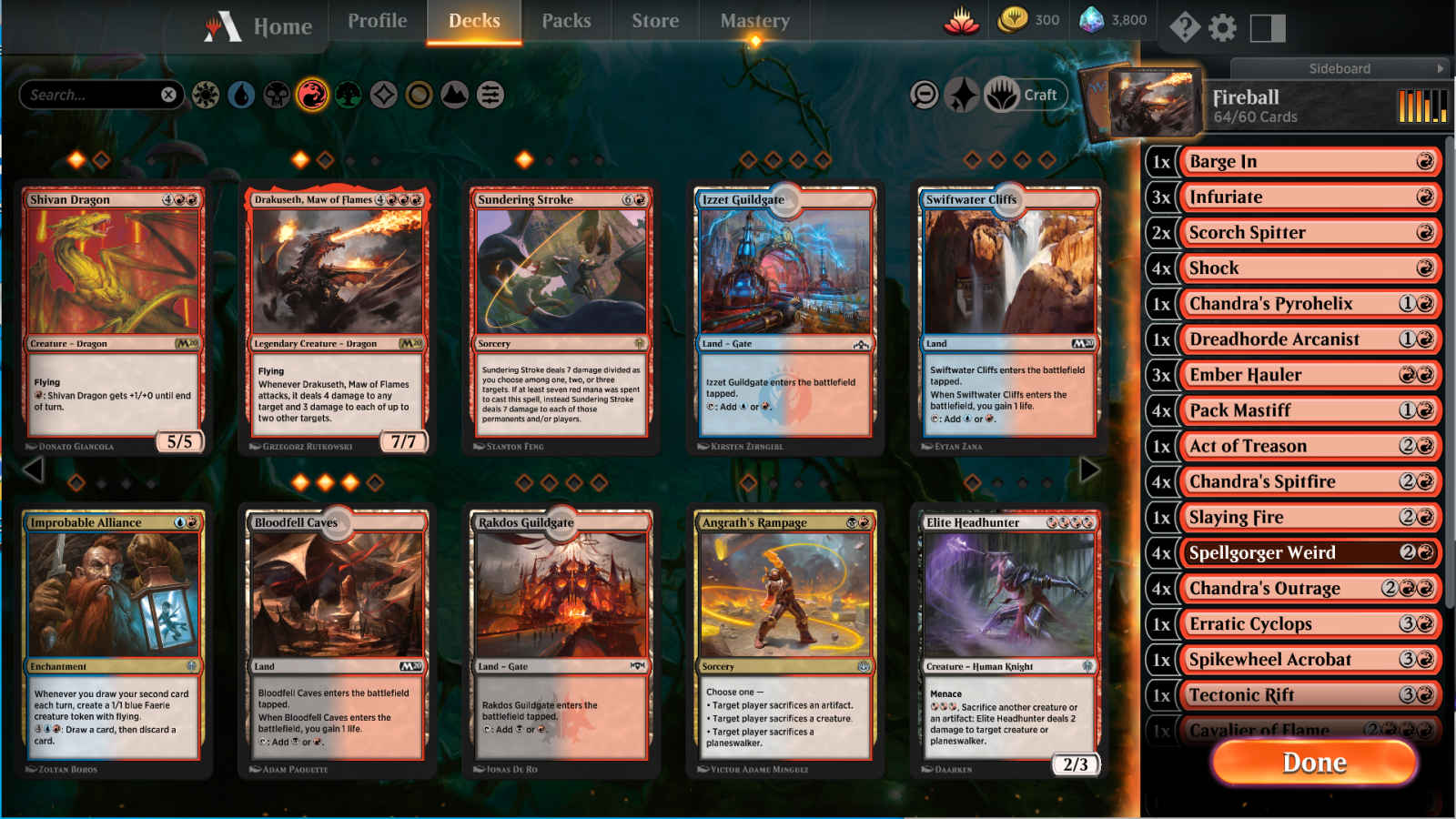
With an optimised deck or two, I hurl myself eagerly back into the Arena, where I’m reasonably pleased with how well (and how quickly) I get matched with other opponents. People are always more interesting – sneaky, cheeky, creative, fun – than AI, and turn times are well-balanced to give you enough time to strategise, with timeouts that prevent you from dithering too long. It’s enough fun, in fact, that I’m dead set on playing the launch celebration event, where you can play with any card in standard, and have the chance to win one of every card as a hefty reward.
I’ve always stayed anxiously away from the competitive end of any online gaming, so this is so far out of my comfort zone it has disappeared over the comfort horizon. But my experience so far has made me feel like with just a few more games, I could give it a shot. That is exactly the sort of thing this game needs to make people like me feel.
Competition isn’t everything in MtG: Arena, however. The game has a collaborative mode, and this is where I get to the aspect of the game that I think really gives it an edge over the competition.
I started playing Magic: The Gathering because I was in love with a boy. I am still in love with that boy, but his interest in sitting cross-legged on the floor of the living room while we pretend we are powerful wizards has waned over the years, and he hasn’t played in a long while.
While I was playing Arena for this review, said boy arrived home from work, and didn’t really clock what I was up to. But then, intrigued by the satisfyingly smashy sound effects, he came over to take a look. Attention hooked by some of the gorgeous new cards, he agreed to sit down and play with me collaboratively. Discussing strategy, and fighting over whose turn it was to open a jointly-won booster pack, simultaneously kindled our nostalgia for our old games, while offering a thrill that real world Magic can’t provide. In fact, it more than made up for the fact that neither of us were, at that moment, in a pub.
Will MtG: Arena offer a proper challenge to the toytown cuteness and simplicity of Hearthstone? Maybe not. It’s not available on mobile, for a start, and there’s no getting around the fact that turn-interrupting play makes it slightly more complex to pick up. But that’s beyond the scope of this review. The important questions are whether it replicates the fun of the tabletop game - at least for the rank and file of casual players like me - and whether it’s a good PC game. The answer to both is a resounding yes.
While I miss making my own sound effects when I send baby dragons into battle, and dabbing hastily at cards I’ve spilled cider on in my excitement, Arena builds on the lessons learned by the rest of its genre, and takes away a lot of the friction and fuss that I will (grudgingly) admit exist in its paper incarnation. If you enjoy the tabletop CCG then, mate, you need to play MtG: Arena.


